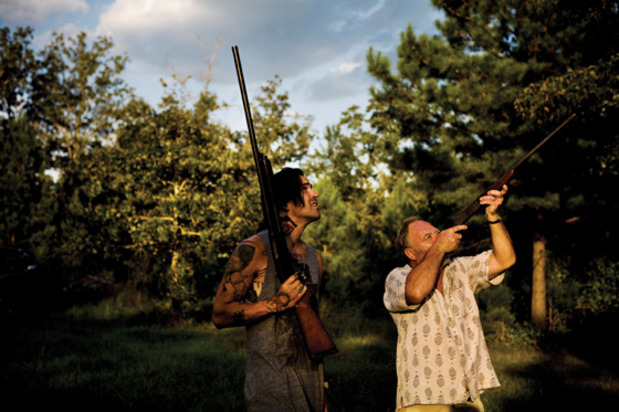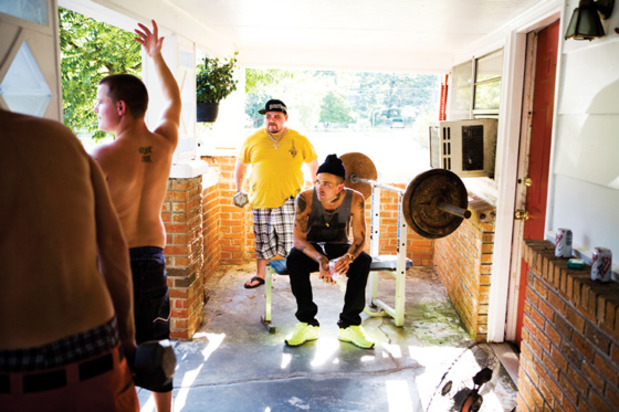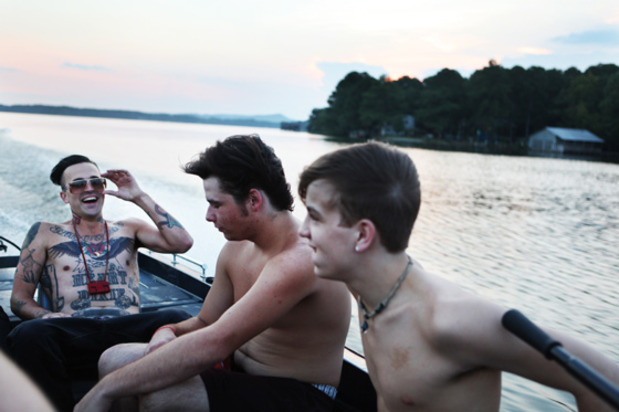Growing up poor, white and in love with hip-hop in Gadsden, Alabama would have been hard enough for Yelawolf, aka Michael Wayne Atha, if that was the only where of it. For young Atha, the child of an undereducated, 16-year-old single mother clawing her way out of the rural ditch she was born into, there were no less than 15 separate wheres before he dropped out of high school, including stops in Tennessee, Louisiana and sometime later, Georgia. By the time he discovered rap by way of a Beastie Boys tape one of his mother’s boyfriends, a roadie for Aerosmith, dropped off, he was already well-acquainted with Southern rock, shooting guns and noodling (catching catfish with your bare hands). On record, Yelawolf’s voice is elastic and his raps well-enunciated, but not to the point that you don’t know you’re listening to a white boy from Alabama. He makes sure of that. It’s as obvious as the faces tattooed on his right arm, of Michael Landon and John Wayne, his namesakes and two of his mother’s favorite actors. It’s something he holds high, like the bold block letters “R-E-D” tattooed on his neck.
At the moment, Yelawolf is at the nexus of the universe of New York’s First Street and First Avenue in a dark burgundy Alabama football jersey personalized to read “Catfish Billy,” his self-appointed nickname, hanging low over black skinny jeans and a pair of neon green Nike Air Max running sneakers. He’s waiting to be interviewed on East Village Radio’s “Baller’s Eve” show and scraping across curbs on a borrowed skateboard. Save for his gaudy, biographical tattoo work, he looks like a teenager hoping for someone among the nightly parade of unsupervised high school children, early evening drunkards, hand-holding couples, homeless bums, a few trannies and some indifferent neighborhood residents to offer him a cup full of beer. He’s already been on the show more times than anyone can remember.
The first Yelawolf song to ever play on “Baller’s Eve” was “Kickin,” the debut single from his 2008 record deal with Columbia. DJ Dirrty, who co-hosts the program known as “The only radio show coming outta NYC reppin’ the Dirty South” alongside fellow Georgia natives Minsky Walker and Kat Daddy Slim, sought it out on the internet after a chance encounter with producer Jim Jonsin at notorious Lower East Side dive bar, Max Fish. Dirrty approached Jonsin cold, recognizing his face from the Ozone magazines he used to distribute around New York City as a street teamer. This kid is next, Jonsin said. He’d been working on Yelawolf’s album at the time, and along with Travis Barker and Diplo, has already completed production for Yelawolf’s Interscope debut, scheduled for next March. Yelawolf’s first guest appearance on “Baller’s Eve” occurred not long after this first airplay, and the show is now a New York home away from home.
After that initial appearance, Yelawolf and Dirrty broke bread at Lil Frankie’s, the Italian restaurant next door where Dirrty also happened to bartend. Between bites of the marinara came a revelation. “You used to skate East Lake. That’s where I know you from!” Yelawolf said to Dirrty, recognizing the DJ from the Marietta skate spot of their youth. As it turns out, the two had sort of known each other for years, though at the time of their first encounter, Dirrty, then just a high school kid named Jordan Merz, couldn’t have cared less. They shared a passion for rap music and skateboarding, the sort of things that have fortfied teenage identity since their respective inventions, things that should have made the two fast friends, but since adolescence plays out in dog years, the span of grades between them might as well have been generations. To Merz, little Atha was a non-entity. That is, of course, until Atha, now Yelawolf, reminded him of their history.

This is a microcosm of Yelawolf’s career: patiently trying to get people’s attention but not really knowing how to do it. “I didn’t get a grip on what I was really supposed to be doing in hip-hop till ’07,” Yelawolf says. “I always could rap, just like anybody could rap, but that type of shit that’s just metaphors and rhymes, there’s no culture there.” 2010’s Trunk Muzik, presented by Atlanta mixtape legend and fellow paleface DJ Burn One, was backwoods funk, box-frame Chevrolets, high-powered hunting rifles and crystal meth labs. The tape’s most crucial achievement is having made converts of a great many non-believers, something Burn One says was no accident. “It’s not like he just got dope overnight, like one day he woke up like, Oh shit, I can rap!” Burn One says. “It’s just that Trunk Muzik succeeded in getting that point across. He always knew how to control a crowd [and] project his voice, but records like ‘Pop The Trunk’ and ‘Love is Not Enough,’ really connected with people.”
What may have gone over people’s heads, or more likely under the radar, was 2008’s Stereo, a phenomenally executed rap tribute to classic rock. The shared tug of rock & roll and rap has derailed a great many artistic ambitions, but Yelawolf walked the line unlike any before him. Slick-talking over looped samples of Pink Floyd and The Doors, Stereo mostly sounds like a kid who loved rock but had to rap because he was scared to sing. But Yelawolf can sing and he’s not afraid of anything. “I took a route that I knew was gonna take a long time, because it’s so fucking new,” he says. “You’re just not gonna get this and that’s cool, but I’m up for the fight. On top of being a white boy, I have these ideals and these subjects that I wanna talk about and that’s not an easy thing to digest. So it’s like learning how to make the music and the lyrics make sense to people, even when they’re not listening. And if they choose to listen, they’ll have something good to listen to.”
Yelawolf’s path to burgeoning greatness was circuitous. Around the time of his 18th birthday, while living in Atlanta, his stepfather offered to buy him a car if he got his GED and went to college. “He bought me this $2000 Honda, and I left,” he says. “I got my GED and got into college just to get the fucking car and I was out.” After selling all of his belongings, Atha and a friend set out to California to become professional skaters. They drove from Atlanta to San Diego and settled in Berkeley shortly thereafter. After chronic ankle injuries derailed his pro skating aspirations, he grew tired of a lifestyle he’d come out West to escape.

On a tip from a friend, Atha took a bus to Seattle for the lure of a $20,000 job on an Alaskan fishing boat. He arrived to a long list of applicants already ahead of him, couch-surfed and hustled money to split hotel rooms with other “street kids,” and made it onto a boat after a week. On the ship, he worked 20-hour days, seven days a week, on waters so cold the mist of waves breaking against the side of the ship would freeze in mid-air, blasting the crew’s faces with powdery ice crystals. He completed the season but got swindled by the ship’s captain who had created a system in which he could keep most of his crew’s pay without any legal recourse. “I went out there to make 20 G’s. I came home with 1500 dollars. And that was the beginning of Yelawolf.”
He returned to Alabama and worked as a day laborer to support his new rap pursuits and found quick success, earning a spot on Missy Elliott’s 2005 reality show talent search, Missy Elliott’s Road to Stardom. It didn’t turn out well. He was the third contestant out of 13 eliminated after requesting “fly beats” instead of the one Elliott had handmade with Dallas Austin during the same episode. His candor most assuredly secured his trip home. Beneath Missy’s track-suited wings, however, would have been an odd place for Yelawolf, as someone who was trying to carve out a path as a stringy-haired country boy who only put his skateboard down to pick up a fishing rod. His departure was for the best, as most reality show departures are, and it brought him a bit of the humility he leans on now.
Earlier this year, when Big Boi asked Yelawolf to join him on the Sir Lucious Left Foot: Son Of Chico Dusty standout “You Ain’t No DJ,” the understudy was overwhelmed. “I always wanted to be part of the Dungeon Family,” he says, before repeating himself for emphasis. “I thought they fi t. Once I found out Bubba Sparxxx was fucking with them, I really wanted to be a part of it. I was like, God, okay, they’re not afraid of the white boy!” Originally slated for an early ’09 release, the album’s street date was pushed back enough times for Yelawolf’s meteor to show up in Big’s stratosphere. When he arrived at the studio, Yelawolf was told Big needed a rock chorus—for a completely different song. By chance, Yelawolf heard “You Ain’t No DJ”’s cosmic minimalism, Andre 3000’s lone production credit on the album, and begged Big Boi for an ear. He’d return only after tracking a schizophrenic 64-bar verse, whipping his voice across the track’s pings like child flying a ribbon though a hail storm. Big cut the fat, graciously accepting 24, but Yelawolf’s inclusion was more than him bestowing the much-coveted OG cosign. “He took the initiative to be like, Fuck man, I’m finna buss on it,” Big Boi says. “It’s deadly MCing going on, I’m talking bout like ninja assassins and it’s like, Now who want some? The South wins again.”

Yelawolf also isn’t just a white boy. He takes his name from his Cherokee roots, but he understands perception and will confront the distinction every time he gets a chance, most recently through double time cadence in a freestyle over Gucci Mane’s “Lemonade” beat: Alabama funk make you lose your teeth like a Mountain Dew soda/ Some saltines wanna live in a box, but guess what? I’m the cracker who showed up. He’s one of them, anyway. And as the other, infinitely more famous one is continuously touted as the greatest rapper of all time, declared so by Kanye West through his Twitter account, Yelawolf looks forward to growing weary of the comparison. “I wouldn’t get tired of talking about Eminem like I wouldn’t get tired of talking about Led Zeppelin,” he says. “That’s a 10-year veteran, the greatest white rapper that ever lived. It’s human nature though. Someone is gonna have to deal with being compared to me at some point.”
The inevitable comparisons, and subsequent debate, will need new parameters. A large majority of any relevant discussion of hip-hop as black culture was excavated (on and off record) during the ’90s, and mostly done so in an effort to preserve the sanctity of hip-hop as black contribution to American music. Yelawolf’s mixtape catalogue speaks more directly to Outkast than any white rapper in existence, but his success will be measured against Eminem’s directly, probably until Yelawolf is finished with music altogether. Eminem went through it in another way, fielding misguided questions about his impact and defending himself against ill-conceived verdicts about his right to participate. And despite an almost religious dedication from white fans across the country, Eminem could never be accused of appropriating rap. He was, and is, a purveyor of proper perspective. Like Eminem before him, Yelawolf is an original, which explains why artists from Bun B to Raekwon to Gucci Mane to Big Boi place his voice amongst their own, for their fans to heed.
The melanin-deficiency of Yelawolf’s earliest adopters casts doubt in the minds of some of hip-hop’s devoted, but in another way, it’s a very logical extension to the pattern of a lot of people who spend a lot of money supporting artists they don’t share very much in common with. “I’ve had people tell me that finally somebody’s telling our story the right way,” Yelawolf says. “Kids who grew up in a trailer park or just on classic rock, they understand cause they lived it. White boys just can’t get besides yourself and start thinking this shit is something you created. That’s where you go Elvis.”
Yelawolf loves Elvis, though. He shouldn’t have to worry about being perceived as some kind of cultural conqueror, but he does. Not so much for his own sake, but for the sake of his fans, people who can look at him and see kids they grew up and fell out of touch with, or ones they never paid any attention to in the first place, or even themselves. People who listen to his music hear the stories of their own towns, stories they’ve told or stories they’ve heard, or just a story that reminds them of what it’s like to love the things that made you. And there also people who don’t see or hear any of those things, people who were never waiting for a Yelawolf to break through, but who will listen anyway, because he’s just that good.
